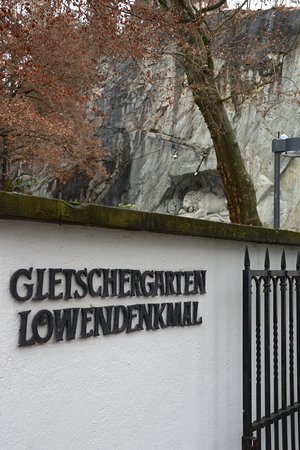Have you ever written an
extensive research paper about a specific place, monument, or memorial? We have
all gotten used to putting hours on end into a word document, drinking loads of
coffee, and walking out of our bedroom for the first time in a week with a
completed masterpiece. Ever ask yourself why put so much effort into something
you will probably never see in person? But you do know if you ever had the
chance to see such in person, the experience would be magical. I got to
experience just that. In the Spring of 2015, I wrote a historical paper on the significance
and meaning of the sculpture and memorial of the Dying Lion of Lucerne located
in Luzern, Switzerland.
| The Dying Lion of Lucerne |
 |
| Welcome to Glacier Garden |
After writing fifteen
pages of well-crafted ingenuity, I knew just about everything about this lion.
When it was built, why, the small and hidden aspects deep within the work
itself and what it stood for. This lion as I argued represented the emergence
of Swiss democracy as an opposition to the French Monarchy. Birthed in 1821,
only 6 short years after Napoleon’s defeat at Waterloo, the Congress of Vienna
had enacted the rebirth of European monarchies. The Swiss wanted no part of
this and although a war memorial to the Swiss Guards killed in the French
Revolution at the Tuileries Palace, it evolved into something significantly
more. With its paw trapping the French fleur de lys, the dying lion is crushing
the old monarchy as the Swiss shield of democracy stands untouched behind him.
The Lion itself symbolizes revolution and is a revolutionary himself. I
presented the paper I produced at the Phi Alpha Theta Conference in Hawaii and
won runner up for best Undergraduate paper. So you can see how attached I am to
this topic. Shortly after I arrived in Germany, I was offered a chance to
travel to Switzerland and see the majestic lion in his cove myself. I would not
pass this up. I will take you on my journey as I entered the gardens of the Löwendenkmal.
 |
| The Gang ready to take on Luzern |
The sun was shining. It
was warm and the city streets of Luzern were busy. Farmers’ Markets control the
bridge and everyone was smiling and happy. It almost seemed like a dream. I
approached the gates to the garden where the lion slept. The trees shaded the
alcove and the atmosphere was calm. Tourists from all over the globe were there
to witness the majestic lion just as I had intended. So many people, but so
little noise. A small hill stood between me and the lion himself. I climbed to
the top and there he was. Within his cove, a spear through his abdomen, sad,
but courageous, dying, but strong. A tear fell from my face into the crystal
pond beneath him as I exclaimed: “Finally, finally I got to meet you.” Having
the opportunity to see something you researched for over 3 months in person is
just a spectacular feeling. You feel the history. You breathe the history.
Hell, you become part of the history. What an opportunity!
The
funniest part about this experience you ask? I strolled into the gift shop to
buy my own personal lion monument after my visit and presented my paper to the
cashier. She gave me 50% off!!! :D
I
concluded my paper with some fine words that I would like to share with you.
Below is Mr. Mark Twain’s interpretation of the Dying Lion of Lucerne. His
comments sum up exactly how I felt as I entered the garden.
“The Lion
lies in his lair in the perpendicular face of a low cliff—for he is carved from
the living rock of the cliff. His size is colossal, his attitude is noble. His
head is bowed, the broken spear is sticking in his shoulder… a clear stream
trickles from above and empties into a pond at the base, and in the smooth
surface of the pond the lion is mirrored, among the water-lilies…The place is a
sheltered, reposeful woodland nook, remote from noise and stir and
confusion—and all this is fitting, for lions do die in such places, and not on
granite pedestals in public squares fenced with fancy iron railings. The Lion
of Lucerne would be impressive anywhere, but nowhere so impressive as where he
is.” ~ Mark Twain, A Tramp Abroad
